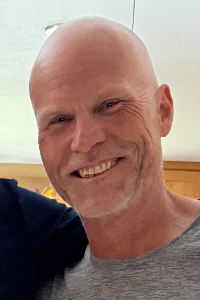The safety net … it’s a fragile thing, and at risk of unraveling

Mike Apfelberg
What keeps you up at night? How many times have I asked and answered this question over the years? Sometimes my answer has been related to the financial sustainability of my own organization. Sometimes my answer has been the frailty of systems of support in our community. Sometimes I even have been kept up at night due to the myriad issues we faced in keeping the public safe and healthy during the pandemic. These days, what keeps me up at night is the safety net… you know, that system of supports which we have woven together through a combination of government programs and nonprofit practices which, taken together, keep our community – and especially those most vulnerable – from falling through the cracks.
Before diving in, I would like to be perfectly clear that some, none, or all of this might come to pass over the next year or two. My purpose in writing this article is to bring up some of the potential impacts of changes currently being proposed, and under NO CIRCUMSTANCES do I want for the reader to come away with the sense that there is certainty that all of this is going to happen. Legislation and the legislative process is very much a messy process… like cooking. And right now, the recipe is very much in the preparatory, and not finalized, phase. So please keep that in mind! One more final caveat… this is a very changing landscape. As of this week, the NH House is finalizing it’s pass of the budget before the Senate gets a crack. And just last week the Federal Government notified the State that it was repealing approximately $80 million worth of COVID related funds which would have been spent by the end of 2026, thus making a bad budget season even worse. So it will be at least a month before we really have a good picture of where the state budget lands.
As everyone knows, there’s a lot happening with policy and budget changes, and much of it will probably impact our local community and nonprofit sector. The purpose of this article is to highlight some of these potential changes and their impacts on health, education, financial stability, domestic violence, and child protection services. I don’t want to sound alarmist, but it’s important for all of us to stay informed about what’s ahead.
Nonprofit organizations play a vital role in Greater Nashua, providing essential services that make our community healthier, stronger, and more connected. The United Way of Greater Nashua leads initiatives like laptop distribution, digital navigators, food security programs, and school supply drives. We and other key nonprofits–such as Nashua Soup Kitchen & Shelter, Harbor Homes, The Front Door Agency, Marguerite’s Place, Gateways Community Services, Revive Recovery, Family Promise, Bridges, the Child Advocacy Center, and Greater Nashua Mental Health–work together to support those in need. Several legislative changes could significantly impact these organizations and the pillars they support:
Health:
• HB 392 (NH): This bill would eliminate the Office of Health Equity, affecting marginalized communities and potentially reducing access to essential health services.
• Medicaid Cuts: Proposed cuts to Medicaid could dramatically reduce access to healthcare for low-income families and place additional strain on state budgets. In Washington, the match to the State’s Expanded Medicaid Program could go below 90%, and if that happens then expanded Medicaid would be triggered for elimination in the state, putting many thousands of Granite Staters at risk for becoming uninsured, and raising the amount of uncompensated service to be needing to be provided by our hospitals, mental health centers, and others. In New Hampshire, the governor’s proposed budget includes work requirements and new co-pays for Medicaid recipients, which could result in individuals losing coverage if they are unable to meet the requirements. Even though these requirements aren’t for the very poorest of our neighbors, nevertheless many low income recipients of Medicaid coverage are already living on the brink, and requiring even a small copay is likely to put many of them into a place of needing to forego other necessities, like food, clothing, childcare, and shelter.
Education:
• Department of Education Cuts: Proposed cuts to the Department of Education could have far-reaching impacts on students and schools:
o Federal Student Aid: Reductions in funding could lead to delays in processing financial aid applications and responding to student inquiries.
o Office for Civil Rights: Cuts could reduce the ability to enforce civil rights laws in educational institutions.
o Program Administration: Reductions in staff who oversee grant distributions to states and institutions could impact the efficiency and effectiveness of these programs.
• Impact on the Education Trust Fund: The governor’s proposal to expand the state’s voucher program to allow participation without regard to income level could have significant implications for the Education Trust Fund. The expansion of the Education Freedom Account (EFA) program is expected to increase costs significantly, diverting funds from public and charter schools and potentially reducing the quality of education for students in public schools.
Financial Stability:
• Federal Funding Freezes: There is uncertainty over federal funding freezes, which could halt funds for climate-related programs and cost billions. This could impact local initiatives aimed at improving financial stability through environmental sustainability.
• H.R. 9495: This bill could remove tax-exempt status from nonprofits deemed to support terrorism, raising concerns about misuse and potentially affecting the financial stability of nonprofit organizations. This is a particularly frightening piece of legislation for anybody who is trying to uplift their community by leading a local nonprofit organization!
• HUD Cuts: Proposed cuts to HUD programs could impact on affordable housing and homelessness services:
o Tenant-Based Rental Assistance (TBRA): Funding is set at $32.14 billion, but still insufficient to cover the needed cost of voucher renewals, potentially resulting in the loss of 32,000 vouchers.
o Homeless Assistance Grants (HAG): The resolution allows the HUD Secretary to repurpose funds for the Continuum of Care (CoC) program, potentially short falling homeless assistance programs by an estimated $168 million.
Domestic Violence and Child Protection Services:
• VOCA Funding Cuts: Funding for the Victims of Crime Act (VOCA) could be cut by nearly a third, reducing the budget from $1.9 billion annually to $1.2 billion. This could jeopardize the jobs of victim advocates and reduce the availability of services for victims of crime, including domestic violence and child abuse.
• VAWA Funding Cuts: The Violence Against Women Act (VAWA) is also facing potential cuts. Funding freezes have already caused significant concern among domestic violence nonprofits, which rely heavily on VAWA grants to provide emergency shelter, legal advocacy, and crisis services. Any cuts to VAWA funding could destabilize these lifesaving services and disproportionately harm marginalized communities.
It’s crucial for nonprofits to stay engaged with policymakers to advocate for the communities they serve. I hope this gives you a sense of what’s being discussed and how it might affect our community. I’m incredibly proud of the work done by our local nonprofits, and I hope you agree that their efforts are vital for maintaining a strong safety net.
In the end, what happens in our government and in our communities reflects who we are and what we want to have happen, so if you wish for a certain outcome, then I encourage you to use your voice (much like I am doing here). Write a letter. Speak to your Congressperson. Call the Governor’s office. Support a local nonprofit organization as a volunteer or donor. And most importantly, never ever forget that GREAT THINGS CAN CONTINUE TO HAPPEN WHEN WE LIVE UNITED.
Mike Apfelberg is president of United Way of Greater Nashua.



